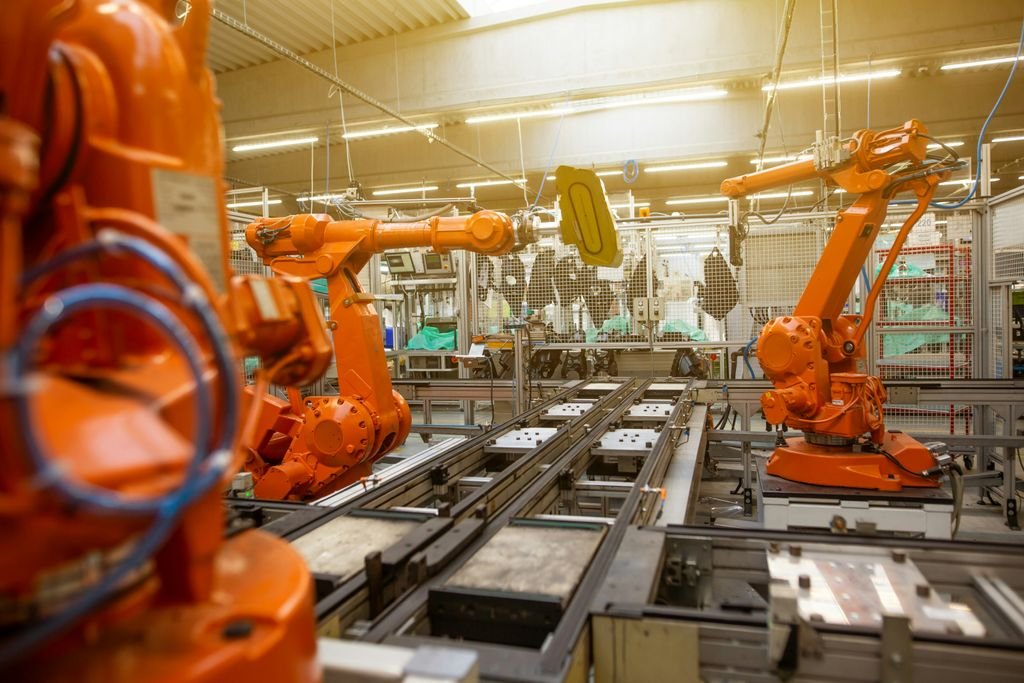Artificial Intelligence (AI) is transforming the automotive industry, revolutionizing car manufacturing and enhancing features. In this article, we will explore the AI-driven innovations in the automotive supply chain, focusing on automating inventory management, predictive maintenance and quality control, and optimizing production schedules. These advancements are reshaping the way the automotive industry operates, leading to increased efficiencies and improved processes.
Key Takeaways
- AI-driven innovations are revolutionizing the automotive supply chain.
- Automating inventory management with AI leads to greater accuracy and efficiency.
- Predictive maintenance and quality control powered by AI improves overall equipment effectiveness (OEE).
- AI-optimized production schedules result in reduced lead times and improved resource utilization.
- The impact of AI on the automotive industry is driving significant improvements in operational processes and product quality.
AI-Driven Innovations in Automotive Supply Chain
Automating Inventory Management
The advent of AI in the automotive supply chain has revolutionized inventory management. AI algorithms can now predict inventory needs with high accuracy, ensuring that production lines are never halted due to a shortage of parts. This predictive capability is critical in an industry where just-in-time manufacturing is the norm and storage space is at a premium.
AI-driven systems can also automate the ordering process, reducing the need for manual intervention and minimizing human error. The table below illustrates the impact of AI on key inventory metrics:
| Metric | Before AI | After AI Implementation |
|---|---|---|
| Lead Time | 10 days | 5 days |
| Inventory Accuracy | 79% | 98% |
| Order Processing Time | 30 minutes | 5 minutes |
By leveraging machine learning, companies can dynamically adjust inventory levels based on real-time demand, seasonal trends, and market fluctuations, leading to significant cost savings and efficiency improvements.
Furthermore, AI facilitates better collaboration between suppliers and manufacturers by providing a transparent view of inventory levels and consumption patterns. This transparency helps in reducing overstocking and understocking, which are common challenges in the automotive supply chain.
Predictive Maintenance and Quality Control
The integration of AI in predictive maintenance is revolutionizing the automotive supply chain by forecasting equipment failures before they occur. AI algorithms analyze historical and real-time data to predict wear and tear, allowing for timely maintenance that minimizes downtime and extends the life of machinery.
- Early fault detection: AI systems can identify subtle patterns indicating potential issues.
- Maintenance scheduling: Optimizes the timing of maintenance tasks to prevent disruptions.
- Quality assurance: AI-driven inspections ensure product quality, reducing the risk of recalls.
By leveraging AI for predictive maintenance, manufacturers can significantly reduce unplanned outages, enhance quality control, and improve overall equipment effectiveness (OEE). This proactive approach to maintenance ensures that production lines are seldom interrupted, which is critical for meeting the high demands of the automotive industry.
Optimizing Production Schedules
The integration of AI into production scheduling represents a significant leap forward in manufacturing efficiency. AI algorithms can analyze vast amounts of data to optimize production workflows, ensuring that resources are allocated where they’re needed most and reducing downtime. This results in a more agile and responsive production line capable of adapting to changes in demand or supply disruptions.
By leveraging machine learning, companies can predict and plan for future scenarios, allowing for dynamic adjustments to production schedules that minimize waste and maximize output.
Key benefits of AI-driven production scheduling include:
- Enhanced resource allocation
- Reduced operational costs
- Improved product throughput
- Greater flexibility in responding to market changes
The table below illustrates a simplified comparison of traditional vs. AI-optimized production scheduling:
| Factor | Traditional Scheduling | AI-Optimized Scheduling |
|---|---|---|
| Flexibility | Low | High |
| Efficiency | Moderate | High |
| Responsiveness to Change | Slow | Fast |
| Cost-effectiveness | Variable | Improved |
Embracing AI for production scheduling not only streamlines operations but also provides a competitive edge in the fast-paced automotive industry.
Conclusion
In conclusion, the integration of artificial intelligence in the automotive supply chain has significantly improved efficiency, accuracy, and innovation. From streamlining production processes to enhancing quality control, AI has revolutionized the way the automotive industry operates. As the impact of AI continues to grow, it is clear that the future of the automotive supply chain will be shaped by the advancements in artificial intelligence. The potential for further optimization and innovation is vast, and the industry is poised to benefit from the continued integration of AI technologies. With the ongoing evolution of AI-driven efficiencies, the automotive supply chain is on a trajectory of continuous improvement and transformation.
Frequently Asked Questions
What is the role of AI in the automotive supply chain?
AI plays a crucial role in automating inventory management, predictive maintenance, quality control, and optimizing production schedules, leading to increased efficiency and cost savings.
How does AI automate inventory management in the automotive industry?
AI automates inventory management by using advanced algorithms to forecast demand, optimize stock levels, and streamline supply chain processes.
What are the benefits of predictive maintenance and quality control powered by AI?
Predictive maintenance and quality control powered by AI help in reducing downtime, preventing equipment failure, improving product quality, and ensuring customer satisfaction.
How does AI optimize production schedules in the automotive supply chain?
AI optimizes production schedules by analyzing real-time data, predicting demand fluctuations, and adjusting production plans to minimize waste and maximize output.
What are the potential challenges of implementing AI-driven efficiencies in the automotive supply chain?
Potential challenges include data security concerns, integration with existing systems, workforce training, and the need for continuous monitoring and optimization.
How is AI contributing to the overall impact of the automotive industry?
AI is revolutionizing car manufacturing and features by enabling smart production processes, enhancing vehicle performance, and creating new opportunities for innovation and customization.





